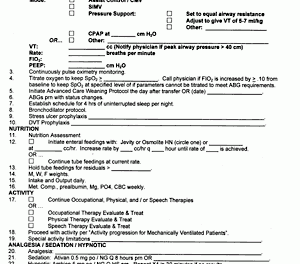A respiratory therapist accounts her days as a patient and stresses the importance of five little words.
A respiratory therapist accounts her days as a patient and stresses the importance of five little words.

For the past 7 years, I have been a CRTT in an approximately 150-bed community hospital. We have an eight-bed intensive care unit and level 2 nursery. We are a designated trauma center for adult and pediatric cases. There is a 30-bed skilled unit attached to our facility. Our respiratory therapists work out of the cardiopulmonary department, so we do a great deal of outpatient cardiac testing and house-wide electrocardiograms. Like most other respiratory personnel, I cover miles in each shift and have worked nights for years. My patients are generally in their beds when I arrive to give them their treatments, and we all know how busy and demanding the job of respiratory care is—so much to do in so little time. The ED may need you, which sets you up for the “see-how-much-I-can-get-done-in-as-little-time” pace each time you go out to do floor treatments. Patients are cranky, clock-watching, and inpatient, and they are not very sweet to look at, or even smell at times. Do they want to be this way? No! If most patients were given a choice, they would choose to be capable of taking care of themselves, and shun the embarrassment of needing someone to do the most simple and intimate tasks for them.
becoming the patient
This was really brought home to me after recent knee surgery. I have had few minor procedures previously and had always pushed myself hard to regain my strength and become independent. I am a mother of four, and three of my children are teenagers living at home. My doctor and others tried to prepare me for the long recovery necessary after the reconstruction of a ligament in my left knee. There were no options; I could do nothing at home or work for more then 20 minutes standing, and had not climbed a flight of steps in months. My life had been filled with some degree of pain since my injury in March until the September surgery. Within those 6 months, I still had not learned to gracefully ask my family or associates to walk slower so I could keep up, or to stop and rest with me, or even admit I was hurting and wanted to go home when they were having a good time. I would make supper and then skip eating because the pain was too intense from standing in the kitchen for a half hour. I worked when I could with pressure sores dug deep into my leg from a brace that I needed to wear to get around. I answered the ED pager swallowing tears and swearing to myself that if I had to take another step, I would die. Then finally the date of my surgery arrived and I knew it was the first step on the road to a full recovery. After months of physical therapy, I would do for myself again, walk without pain, climb steps to the choir loft, and gain back the pride I had to bury. But none of this was to come without a few more hard lessons learned.
Day 1 postoperative—home from the Day Surgical Unit
I was drugged for the immense pain, and surfacing from the 3 or so hours of anesthesia. My first trip to the bathroom was a gut-wrenching experience in both pain and embarrassment. I could not even lift my left leg from the bed. My crutches were just inches too far from my reach. I called out for someone to come help and several family members showed up. I made guttural sounds as they helped me up. My bottom was not covered by my nightshirt, much to my chagrin, and when I tried to give them some direction in how to help me, my words came out in partial sentences and barked commands. There was no grace to my movements, and I caused fear and anxiety in my kids as they watched and helped as they could. I assured them that I was fine as the tears rolled down my face. They were scared enough to bring me water and food and lay them at my bedside and check on me for a few hours. I hated it. I was the mother, the medical professional, the caregiver. I did not want my children caring for me at 42 years old. I usually take care of my appearance, my hair, and my teeth and often invest in creams, lotions, and scents to make myself more appealing. I lay there with no makeup, no way to reach a washcloth, and no desire to ask anyone for help. I had a bottle of lotion and some fragrance at my bedside and I indulged myself in those so I would not be offensive to anyone stepping into my room. When my son checked on me, I asked for my brush; when my daughter stepped in, I got help putting on some socks. My oldest son and husband kept the ice coming for cold therapy on my knee. I waited, groaning each time I needed to roll side to side. Praying someone would come to the bedroom soon, so I would not have to call out for help.
The next day dawned. The family had to go back to work and school. My sweet 19-year-old daughter stuck her head in before she left and, like music to my ears, she asked, “Is there anything you need?” IS THERE ANYTHING I NEED! I meekly made as few requests as possible, such as put some towels in the bathroom. Help me position. Place my brush closer. Please get me some fresh water and crackers to take my medicines with. Then everyone was gone. The next bathroom trip was on my own. How it hurt as I dragged the leg, gagged on my tears, and felt very sorry for myself. How dare they leave me alone! Wait. Hadn’t I assured them that I could do this? I washed up, changed nighties, limped back to bed with my crutches, and swallowed my pain pills and my pride. But I had not really learned well. There I lay straining my ears for sounds in the house, waiting. How come they did not run in the door and check on me? Did I really exude that much self-confidence and seem capable? I was lying in my own self-pity, wishing the next person who came to my door would ask, “Is there anything you need?” As days passed, I began to apply what I had realized.
The bedridden patient
He has always been the provider in his home. He was the one who took care of things around the house. Now he is stricken with an illness and brushing his teeth makes him short of breath. He cannot get to the commode without help. He is too weak to lift the large novel he has at his bedside, and his eyes blur as he tries to focus on his crossword puzzle. He has lain for more than an hour hoping someone would come into his room. He knows the nurses are busy and he does not want to trouble them. He does not want to be a burden. One of us enters his room. He may have a dozen requests. He may be irritable. He may be in pain. He may be lonely. He may be scared. We know he is sick. He may be disoriented. He may not know how to ask for help. We may be the only one he knows to ask for help. We hate being the one arriving at the nurses’ station to say that Mr Smith in Room 219 needs something, as much as they hate to see us coming with the request. But it is much easier on us. We are busy, but we are not sick and in pain and bedridden. So consider the relief given to your patient when you ask, “Before I leave, is there anything you need?” You have most likely brightened his whole day. N
Patricia Burney, CRTT, is night shift supervisor of the cardiopulmonary department at Illini Hospital, Silvis, Ill.








